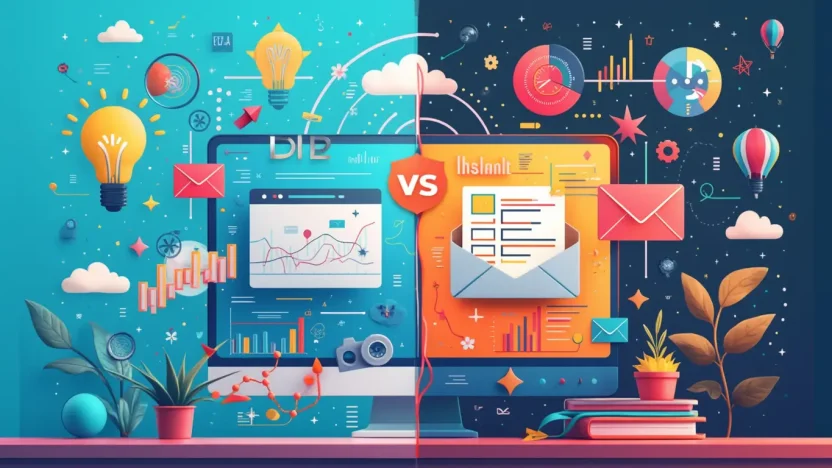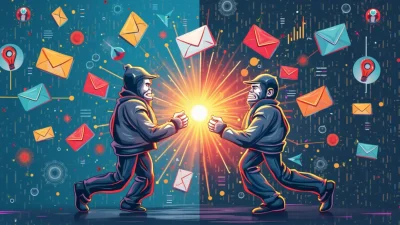In the ever-evolving digital landscape, knowing the difference between marketing automation vs email marketing can be the secret sauce to supercharging your marketing strategy. As a digital marketer or tech-savvy entrepreneur, mastering these tools will help you scale your outreach and maximize your efficiency like never before.
While email marketing has long been a cornerstone of the digital marketing toolkit, marketing automation introduces a level of sophistication that promises to revolutionize how you interact with potential customers. So, what are the crucial distinctions, and how can they impact your business growth?
Join us as we dive deep into the 7 key differences that could redefine your marketing strategy, ensuring you stay ahead of the curve in this competitive digital space.
Read on to discover the nuances, benefits, and how-tos in this intriguing head-to-head comparison!
Table of Contents
- Understanding Marketing Automation
- Exploring Email Marketing
- Key Difference 1: Scope and Functionality
- Key Difference 2: Personalization and Customization
- Key Difference 3: Integration Capabilities
- Key Difference 4: Analytics and Reporting
- Key Difference 5: Efficiency and Automation
- Key Difference 6: Audience Segmentation
- Key Difference 7: Cost and Budget Considerations
Understanding Marketing Automation
In the landscape of modern marketing, understanding the power of marketing automation vs email marketing is crucial. Marketing automation takes your campaigns beyond simple emails by integrating various digital channels. Ever wondered how companies manage personalized ads, social media, and user behavior tracking? That’s the magic of marketing automation at work. By automating repetitive tasks, marketers gain valuable time to focus on strategy.
| Feature | Marketing Automation |
|---|---|
| Scope | Comprehensive, multi-channel |
| Tools | CRM, social media, analytics |
| Goal | Holistic customer engagement |
Unlike traditional email tactics, marketing automation allows seamless campaign management across diverse channels. It’s not just about sending messages; it’s about crafting a smart flow that guides your audience at every touchpoint. Successfully leveraging this approach requires understanding your audience, strategy, and tools—all key elements in this digital age.
Exploring Email Marketing
Email marketing, a cornerstone of digital strategies, centers on sending targeted messages to engage customers. But how is it different from marketing automation? Let’s dive in to discover its unique features.
Email marketing thrives on direct communication. It enables businesses to share promotions, newsletters, and announcements directly with customers. The simplicity and directness of email marketing make it accessible and effective for reaching large audiences quickly. However, it lacks the sophistication of automated workflows seen in marketing automation.
When considering marketing automation vs email marketing, remember that email marketing is perfect for personal messages. Yet, it often lacks the integrated data capabilities found in comprehensive automation platforms.
| Feature | Email Marketing | Marketing Automation |
|---|---|---|
| Communication Type | Direct | Automated |
| Data Integration | Limited | Comprehensive |
| Usability | Simple | Complex |
Key Difference 1: Scope and Functionality
The debate between marketing automation vs email marketing often starts with understanding their scope. Marketing automation is a comprehensive system that manages campaigns across various channels, including social media and CRM systems. Email marketing, meanwhile, focuses exclusively on sending targeted emails. Marketing automation offers a broader range, making it an ideal choice for businesses that want to integrate multiple marketing tools.
| Aspect | Marketing Automation | Email Marketing |
|---|---|---|
| Scope | Multi-channel management | Email campaigns |
| Functionality | Automated workflows, CRM sync | Email targeting |
Key Difference 2: Personalization and Customization
In the showdown between marketing automation vs email marketing, personalization stands out as a crucial factor. While email marketing allows for basic personalization such as adding a recipient’s name, marketing automation elevates this by customizing each interaction based on user behavior. This means crafting specific messages that resonate individually with each user, boosting engagement and conversion rates.
| Feature | Email Marketing | Marketing Automation |
|---|---|---|
| Personalization Level | Basic | Advanced |
| Customization Approach | Static | Dynamic and Behavioral |
Key Difference 3: Integration Capabilities
When it comes to marketing automation vs email marketing, integration capabilities stand out as a crucial difference. Marketing automation platforms often offer powerful integrations with CRM systems, social media, and analytics tools, enabling seamless data flow.
Benefit: Robust integration fosters comprehensive campaign management.
Email marketing, however, generally features limited integrations, focusing mainly on communication and lead nurturing.
| Feature | Marketing Automation | Email Marketing |
|---|---|---|
| CRM Integration | Advanced | Basic |
| Social Media Sync | Available | Limited |
Key Difference 4: Analytics and Reporting
Dive into the world of data with marketing automation vs email marketing. Marketing automation platforms shine by providing robust analytics and comprehensive reporting tools that track customer journeys from start to finish. On the flip side, email marketing focuses primarily on metrics like open rates and click-through rates. Ever wondered how marketing automation gives you a broader viewpoint?
| Feature | Marketing Automation | Email Marketing |
|---|---|---|
| Data Scope | End-to-end journey | Email-specific metrics |
| Reports | Comprehensive arc | Basic analytics |
Both have their strengths, but for holistic insights, marketing automation leads the way!
Key Difference 5: Efficiency and Automation
When we think about marketing automation vs email marketing, efficiency and automation stand out as vital factors. Marketing automation streamlines tasks by harnessing advanced technology, reducing manual work, and saving time. In contrast, email marketing often requires more human input for personalized messaging. Which one eases your workload? It’s crucial to consider the scale and scope of your campaigns.
| Aspect | Marketing Automation | Email Marketing |
|---|---|---|
| Task Automation | High | Low |
| Manual Input | Minimal | Significant |
Key Difference 6: Audience Segmentation
Is segmentation the game-changer in the debate of marketing automation vs email marketing? Absolutely! Marketing automation offers advanced segmentation capabilities, letting you precisely target individuals based on behavior and engagement metrics. Email marketing, while effective, typically offers more basic segmentation options focusing on demographic or static lists.
| Aspect | Marketing Automation | Email Marketing |
|---|---|---|
| Segmentation Depth | Advanced, dynamic, & behavior-based | Limited, static & demographic-based |
By using dynamic segmenting, your messages will resonate deeper, enhancing marketing effectiveness and personalization.
Key Difference 7: Cost and Budget Considerations
When deciding between marketing automation vs email marketing, cost plays a crucial role. Let’s explore!
| Factor | Email Marketing | Marketing Automation |
|---|---|---|
| Initial Investment | Lower costs with fewer features | Higher upfront expense, more capabilities |
| Long-term Savings | Basic functionalities, additional costs for growth | Scalable solutions, cost-effective as you scale |
Think about how each option fits your budget for your long-term strategy. Balancing features with cost helps make the best decision for your business’s needs.



